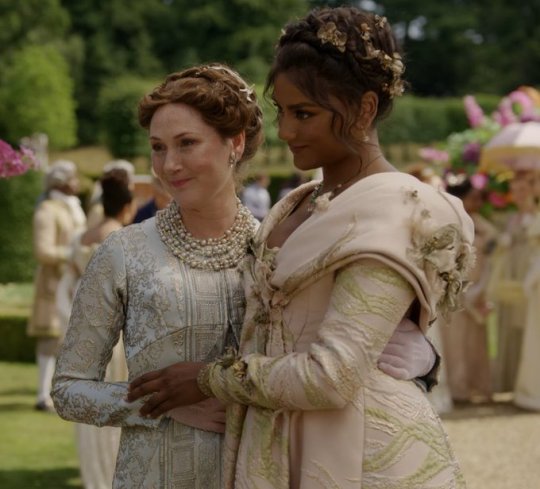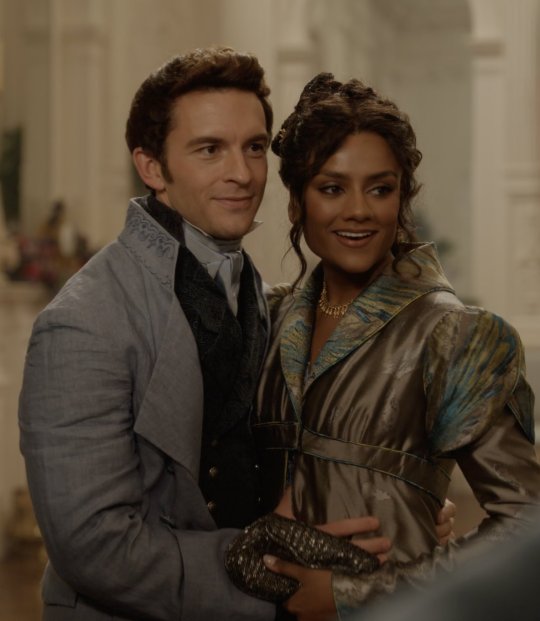#we already know that eloise thinks she's the coolest
Explore tagged Tumblr posts
Text
Like mother

Like son

Kate is the apple of the collective Bridgerton eyes
#bridgerton season 3#anthony bridgerton#violet bridgerton#kate sharma#kate sharma x anthony bridgerton#i'm not even joking#she is canonically Gregory's first crush#we already know that eloise thinks she's the coolest#and this season already established that if you asked francesca who her favourite sibling is#she's answering kate without hesitation#oh kate sharma you will always be beloved
172 notes
·
View notes
Text
On male and female deaths on Lost
(I’m sure somewhere in the fandom the following has been pointed out already, but I haven’t seen any posts about it, so I’m writing my own. Keep in mind that I’ve only just started my first-ever rewatch. I checked Lostpedia whenever I was unsure about something, but there could be mistakes in here, although I’m confident that I’m right about the overall pattern I’m observing. This is a critical post, but rest assured Lost is still one of my favorite shows. Sometimes you gotta complain about something you adore. Also, I’m excluding Nikki and Paolo from this post, lol.)
It’s been pointed out that Lost repeatedly uses the “women in refrigerators” trope: with Shannon, with Libby, with Charlotte, and with Juliet. (You could also make an argument for other characters, including Nadia and, if non-love interests count, Alex, but I’m going to focus on members of the main cast.) While thinking about Lost’s many main-cast deaths, another gendered pattern occurred to me: female characters’ deaths tend to be accidents, whereas male characters have more agency over their own deaths. I think this trope (which probably has a name but I don’t know what it is) is very closely connected to women in refrigerators, but I’ll get to the connection at the end. Let’s go through each of the main-cast characters who died and see how they died. Ladies first:
Shannon dies while chasing after Walt’s image. Ana Lucia hears her coming at shoots her out of fear. Ana Lucia could just as well have shot Sayid, who was running after Shannon and calling to her, but she didn’t.
Ana Lucia and Libby both die at Michael’s hand in his quest to save Walt. Ana Lucia dies because she happens to be guarding Ben and Libby dies because she stumbles upon the scene of the crime. If it had been a man guarding Ben, Michael would have shot him, but it wasn’t, and if Hurley had gone back for the blankets instead of Libby, Michael would have shot him, but he didn’t.
Charlotte dies as a complication of time travel, which could just have easily happened to Daniel or Miles, but it didn’t.
Juliet dies because she gets caught in a chain and falls down the shaft that became the Hatch. The chain could just as easily have pulled Sawyer to his death, but it didn’t.
Ilana dies because she mishandles dynamite. This could have happened to any of the men who handled dynamite, but it didn’t (not counting Arzt because he wasn’t a main character).
Finally, Sun dies because the explosion in the submarine caused her to be trapped behind a heavy...I don’t know what it was but the point is she couldn’t get free so she drowned.
Out of the seven main female characters who die, not one of them chooses their death, and only two (Juliet and Sun) have a chance to confront what’s about to happen to them. Both of them use their last moments to tell their men that they love them. I’m not saying that’s a bad thing in itself—after all, Jin also uses his last moments to tell Sun that he loves her—but the point is that there are no women who get cool death speeches about anything else like some of the men do.
Now the gentlemen:
I’m going to break chronological order for a second to start with Jin, as the difference between his and Sun’s deaths illustrates the pattern I’m talking about. It could just as easily have been him who got stuck behind the heavy thingy, leaving Sun to make the choice to die with him, but it wasn’t. Sun’s death is an accident; Jin’s death is a choice that gives the audience our final impression of him.
Going back to season one, Boone could be seen as an exception to the pattern. He dies because Locke told him to check out the plane. He’s “the sacrifice the island demanded” or whatever, but he doesn’t willingly sacrifice himself. Still, he chooses death in the sense that he explicitly absolves Jack of the responsibility to try to keep him alive.
Eko dies facing the smoke monster head-on. He gives ones of the coolest speeches in the show, making peace with his past and bringing his character arc to a close.
Charlie knows well ahead of time that he’s going to die. Desmond offers to go down to the Looking Glass in Charlie’s place, but Charlie takes responsibility for the task. He drowns intentionally, bravely, and at peace with himself, having done something heroic.
Michael dies as a deliberate act of redemption when the bomb explodes on the freighter. He stays behind to die so that Jin, Desmond, and the Oceanic Six can survive.
Locke, as a murder victim, is another possible exception in that he has no agency over his death. It’s never 100% clear why Ben killed Locke as far as I know, but it seems to be at least partly out of jealousy. Locke’s death is definitely anything but accidental or random.
Daniel is shot by Eloise for threatening Richard. This in itself is already pretty far from random. Then there’s the fact that Eloise had spent Daniel’s whole life bringing this moment about. True, it’s a very sudden death, not a death Daniel was able to choose or to face on his own terms. He dies feeling like a pawn. On the other hand, it’s not random or accidental and it explains a lot about Daniel’s life.
Sayid, my darling, beautiful, brave Sayid, dies, like Charlie and Michael, as an act of self-sacrifice and redemption. Before he carries the bomb away from his friends, he makes sure Jack is prepared to be the hero the island needs. Sayid’s death is meaningful on both an external level and an internal level. Not only does he save Jack, Kate, Sawyer, and Hurley, but by doing so he overcomes the “sickness” that had brought out the worst in him, and thus he proves that he was at heart a good man. I have to take a timeout from this post to cry.
Okay, I’m back. Finally, Jack dies of his wounds after fighting the Man in Black and restoring the cork at the center of the island. He willingly sacrifices himself to make sure good triumphs over evil and to make sure the passengers on the Ajira plane make it off the island alive. He dies at peace, with a smile on his face, having fulfilled his destiny. I have to go cry again.
Okay, I’m back again. So, out of nine men who die, only three—Boone, Locke, and Daniel—can really be seen as victims. Of those “victims,” only’s Boone’s death is really random, and he gives the audience closure with a cool death speech. The remaining six know that they have to die in advance, and they face death with great dignity and courage.
So, what have we learned, and how does this connect to the four women in refrigerators? Well, tropes aren’t an exact science, so your mileage may vary on what I’m about to say, but in my opinion, a character is usually only “fridged” when their death isn’t really about them at all. If Libby had died bravely, standing up to Michael and defending Ana-Lucia, and if in doing so she had reached the culmination of previously established character arc, then I wouldn’t consider that an instance of fridging—at least, not when evaluated on its own as opposed to as part of a pattern of women dying and men being sad. Fridging basically means turning a character into a prop that moves the story forward, rather than letting that character embody a story in their own right. Not that none of the women who died had interesting stories. But their deaths weren’t part of those stories; instead, they interrupted those stories. Take Shannon, for instance. She might be the woman whose death comes closest to meaning something other than sadness for a man. After all, she initially comes off as pretty self-centered, but by going after Walt she shows concern for someone else. But her growth just gets cut short when she gets shot. That didn’t have to happen. She could have said some last words to Sayid about how she hoped the rest of the gang would rescue Walt. Or something like “make sure Vincent is taken care of.” But because she doesn’t get to choose her death OR say anything before dying, her significance as a character vanishes and what’s left is a plot development for Sayid (and, to be fair, to a lesser extent Ana-Lucia) to react to. The men’s deaths are about the men one way or another: either they’re targeted by someone else for who they are or for a choice they’ve made (Eko, Locke, Daniel), or they choose death (Boone, Charlie, Michael, Sayid, Jin, Jack). Not one of the women’s deaths is about that woman in either of these ways. In other words, when a man dies, it’s part of his story, and when a woman dies, it terminates her story. In other other words, men are the protagonists of their own deaths and women aren’t. I’m not saying every one of the women’s deaths was objectively bad writing or that every one of the men’s deaths was objectively good writing. I’m just saying the pattern seems glaringly obvious now that I’ve noticed it.
Finally, some statistics: Out of nine women whose actresses had main-cast billing, only two—Kate and Claire—were alive at the end of the show. Out of seventeen men whose actors had main-cast billing, eight—Hurley, Ben, Sawyer, Walt, Miles, Richard, Frank, and Desmond—were alive at the end of the show. So while more individual men (nine, or ten if you count Paolo) than women (seven, or eight if you count Nikki) die, a much larger chunk of the female cast is killed off than the male cast. Women have a 22% survival rate and men have a 47% survival rate. This suggests that the writers are simply more interested in keeping men’s stories going than women’s. Hopefully this is obvious, but I’m not accusing the writers of having some nefarious woman-hating agenda. I doubt they realized what they were doing. I think it stems from subconscious assumptions about men and women that manifest in all sorts of media. It doesn’t make that media irredeemably misogynistic, let alone flat-out irredeemable. It’s just unfortunate.
#x#Lost#Lost show#abc lost#Anna watches tv#Anna watches Lost#I have many thoughts#female characters#male characters
25 notes
·
View notes